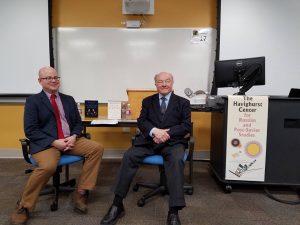By Mohinee Mukherjee
April 7, 2017. Oxford, OH. Former U.S. Ambassador to the Soviet Union Dr. Jack Matlock Jr. provided insight about past, present, and future Russian-American politics at the Annual Havighurst Lecture.
Havighurst Center Interim Director and Professor of History Dr. Stephen Norris began the session asking who is to blame and what is to be done in terms of the tense Russian-American relationship, with references to Alexander Herzen’s and Nikolai Chernyshevsky’s famous novels respectively.
Matlock then discussed how the American public and decision leaders learned the wrong lessons from the Cold War, especially as many translations discussing the events were biased toward American superiority.
“The Cold War ended by negotiations, often in the Soviet Union’s favor,” Matlock said. “The Soviet Union collapsed not due to Western powers, but because of [former Soviet Union General Secretary of the Communist Party Mikhail] Gorbachev’s attempts to democratize.”
Matlock added that the end of the Soviet Union in 1991 did not signify the end of the Cold War. In fact, Matlock said, the Cold War ended two years prior to the Soviet Union ending, as the Soviet Union was collaborating more with the U.S. than the U.S.’s own allies.
A key issue now was Americans considered their values different from Russians, Matlock said, when in reality, Russians had the same goals as Americans but saw them differently. This disparity added to the tense relationship between the countries.
“We push [the Russians] aside. This is [the Russians’] view,” Matlock said. “It doesn’t help to act like we’re better than them.”
In terms of who is to blame, Matlock said both governments are responsible for misrepresenting the end of the Soviet Union and over or underreacting about present political issues.
“What is to be done? [Russians and Americans] need to find peaceful ways to cooperate in common interests and diminish [anything that can’t be resolved],” said Matlock, who considered the Russian possession of nuclear arms as the biggest threat. “Russia is not the enemy.”
Matlock also answered questions about Russia’s alleged involvement in hacking the 2016 U.S. Presidential election. After reading the declassified report, Matlock said that there was not evidence that Russia hacked into any election procedures, such as sharing internal Democratic National Committee communications with WikiLeaks.
“It’s pretty clear [Russia] didn’t know anything more than we did,” said Matlock, who also found the idea of Russia influencing the American election absurd. “Assuming [Russia] was behind the hacking, what did they reveal? Were they lies?”
“The [WikiLeaks] report said everything that was the truth,” Matlock added.
Matlock also discussed Russia’s influence over the Syrian Civil War, and the difficulty in remaining optimistic over a ceasefire. He said that while Russia did not support Syrian President Bashar al-Assad killing Syrian citizens, Russia had extremely important interests in the region. Many ISIL terrorists came from the former Soviet Union, and should they return to Russia, it will be a major issue for the Kremlin. While it did not excuse what Russia had done, Matlock explained, the Russians believed Assad was the best equipped to fight ISIL.
“Russia doesn’t see any other possibility to keep ISIS and jihadists out,” said Matlock, who added that it was important for the U.S. to cooperate with Russia to subdue Assad from the beginning of the conflict.
In addition, Matlock discussed Russia’s relationship with Ukraine and the Baltic states. While Russia did send troops into Ukraine, Matlock said, the Crimean referendum did vote in favor of annexation into Russia. Matlock added that the Russian takeover of the region was peaceful. He cited the U.S. involvement in Ukraine as an overreaction.
“We had senior U.S. officials talking to the Ukrainian ambassador about who should be foreign prime minister in Ukraine,” Matlock said. “It’s like Russia and China interfering in Mexico. Would we put up with that? I don’t think so.”
In terms of Russia and the Baltic states, Matlock believed Russia had nothing to gain from the region in terms of expanding its borders, so it was not a threat.
“The idea that [Russian Federation President Vladimir] Putin is trying to reestablish the Soviet Union is absurd,” Matlock said. “Even if he tries, there’s no way [he can]. [Putin] considers the fall [of the Soviet Union] a failure because it put more Russians outside of Russia.”
Matlock’s final discussion explored the possibility of a positive relationship between the U.S., Western/Central Europe and Russia. Matlock recalled an experience in the spring of 1983, when the Cold War was “hot as it’s ever been.” Matlock worked with former U.S. President Ronald Reagan to appease the situation in three years. Moreover, he remembered that many Americans did not believe President Reagan would be the president to end the Cold War, but he did, proving that relations can change quickly and surprisingly. Matlock envisioned a similar outlook in present-day U.S.-Russian politics.
“I’ve never been a Trump supporter, but I hoped if he could cooperate with Russia, we’d be on a new way,” Matlock said. “There’s no good reason for Russia to be an enemy [of ours] and there’s no reason for NATO to be an enemy to Putin.”
“We need to straighten things out,” Matlock added. “I’ve witnessed what can happen when the right leaders make the right decisions.”
Matlock served for 36 years in the Foreign Service. His assignments included translating diplomatic messages between former Soviet Union Premier Nikita Krushcev and former U.S. President John F. Kennedy during the Cuban Missile Crisis, conducting Lee Harvey Oswad’s exit interview in the Soviet Union to return to the United States, serving as American Ambassador to Czechoslovakia, attending U.S.-Soviet Summits, and serving in the National Security Council to end the nuclear arms race.
In addition, Matlock spent 60 years completing his dissertation for his doctorate degree in Russian Literature, which he was finally awarded in 2013 from Columbia University.
Mohinee Mukherjee is a senior majoring in finance with minors in supply chain management and history.

